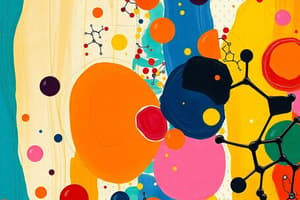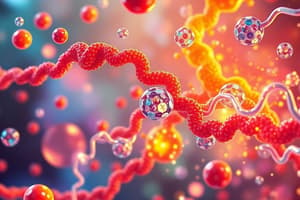Podcast
Questions and Answers
What is the difference between organic compounds and inorganic compounds?
What is the difference between organic compounds and inorganic compounds?
- Inorganic compounds contain carbon atoms bonded together.
- Organic compounds do not contain carbon.
- Inorganic compounds are derived from living organisms.
- Organic compounds contain carbon atoms bonded together. (correct)
What is the difference between monosaccharide and polysaccharide?
What is the difference between monosaccharide and polysaccharide?
Monosaccharide is composed of a single sugar molecule, while polysaccharide is a complex carbohydrate composed of three or more monosaccharides.
What is the difference between condensation reaction and hydrolysis reaction?
What is the difference between condensation reaction and hydrolysis reaction?
A condensation reaction involves two molecules covalently bonded through the loss of a water molecule, while hydrolysis reaction breaks down polymers into monomers by adding water.
What is the difference between starch and glycogen?
What is the difference between starch and glycogen?
What is the difference between a monomer and a polymer?
What is the difference between a monomer and a polymer?
List the four groups of organic compounds.
List the four groups of organic compounds.
How many valence electrons does a carbon atom have?
How many valence electrons does a carbon atom have?
What term is used to describe 'giant molecules'?
What term is used to describe 'giant molecules'?
Macromolecules are created and broken down by the addition or removal of a ___________ molecule.
Macromolecules are created and broken down by the addition or removal of a ___________ molecule.
By what process are macromolecules formed?
By what process are macromolecules formed?
List three types of carbohydrates.
List three types of carbohydrates.
What are the monomers that compose carbohydrates?
What are the monomers that compose carbohydrates?
What is the storage form of excess glucose in plants?
What is the storage form of excess glucose in plants?
What is the storage form of excess glucose in animals?
What is the storage form of excess glucose in animals?
What is the name of the stringy, fibrous material that serves as a strengthening tissue in the cell walls of plants?
What is the name of the stringy, fibrous material that serves as a strengthening tissue in the cell walls of plants?
List the characteristics of carbon that make it possible to build a large variety of organic compounds.
List the characteristics of carbon that make it possible to build a large variety of organic compounds.
Explain the relationship between these terms: monomer, polymer, hydrolysis reaction, condensation reaction, and macromolecule.
Explain the relationship between these terms: monomer, polymer, hydrolysis reaction, condensation reaction, and macromolecule.
What are functional groups?
What are functional groups?
What is the structural formula for Hydroxyl?
What is the structural formula for Hydroxyl?
What is the structural formula for Carboxyl?
What is the structural formula for Carboxyl?
What is the structural formula for Amino?
What is the structural formula for Amino?
What is the structural formula for Phosphate?
What is the structural formula for Phosphate?
What role do functional groups play in the molecules in which they are found?
What role do functional groups play in the molecules in which they are found?
How is a water molecule produced when two monomers undergo a condensation reaction?
How is a water molecule produced when two monomers undergo a condensation reaction?
What elements form carbohydrates, and in what ratio are these elements present?
What elements form carbohydrates, and in what ratio are these elements present?
Flashcards are hidden until you start studying
Study Notes
Organic vs Inorganic Compounds
- Organic compounds are derived from living organisms and contain carbon atoms bonded to other carbon atoms.
- Inorganic compounds do not have carbon atoms bonded in the same manner.
Monosaccharides vs Polysaccharides
- Monosaccharides consist of a single sugar molecule.
- Polysaccharides are complex carbohydrates made of three or more monosaccharides.
Condensation vs Hydrolysis Reactions
- Condensation reactions involve the covalent bonding of two molecules with the loss of a water molecule.
- Hydrolysis reactions break down polymers into monomers through the addition of water.
Starch vs Glycogen
- Starch serves as the storage form of excess glucose in plants.
- Glycogen is the storage form of excess glucose in animals.
Monomers vs Polymers
- Monomers are the smaller repeating subunits that combine to form larger structures called polymers.
- Polymers consist of many similar or identical building blocks linked by covalent bonds.
Groups of Organic Compounds
- Main groups include carbohydrates, lipids, proteins, and nucleic acids.
Carbon Atoms
- A carbon atom has four valence electrons.
Macromolecules
- Macromolecules refer to large molecules formed from smaller subunits.
Role of Water in Macromolecule Formation
- Water plays a crucial role in the formation and breakdown of macromolecules through condensation and hydrolysis reactions.
Polymerization
- The process through which macromolecules are formed from smaller monomers.
Types of Carbohydrates
- Common types include sugar, starch, and cellulose.
Monomers of Carbohydrates
- Glucose molecules are the monomers that make up carbohydrates.
Storage of Glucose
- Plants store excess glucose as starch; animals store it as glycogen.
Cellulose
- Cellulose is a fibrous material providing structural strength in plant cell walls.
Characteristics of Carbon
- Carbon's four valence electrons allow it to form strong, stable bonds, creating a vast variety of organic compounds.
- It can form chains that are straight, branched, or ringed and can create various types of bonds (single, double, triple).
Relationship Between Key Terms
- Monomers are linked in condensation reactions to form polymers.
- Polymers can be separated back into monomers via hydrolysis reactions.
- Macromolecules are essentially large polymers.
Functional Groups
- Functional groups are clusters of atoms that determine the shape and reactivity of molecules by attaching to carbon skeletons.
Structural Formulas of Functional Groups
- Hydroxyl: -OH
- Carboxyl: HOOC-
- Amino: -NH2
- Phosphate: -PO4
Role of Functional Groups
- Functional groups confer molecular shape and are integral to chemical reactions.
Formation of Water During Condensation
- A water molecule is produced when one monomer donates a hydroxide ion and another a hydrogen ion, which combine to form water.
Composition of Carbohydrates
- Carbohydrates consist of carbon, hydrogen, and oxygen in a 1:2:1 ratio (CH2O).
Functions of Carbohydrates
- Carbohydrates primarily serve as energy sources and structural components in living cells.
Studying That Suits You
Use AI to generate personalized quizzes and flashcards to suit your learning preferences.




